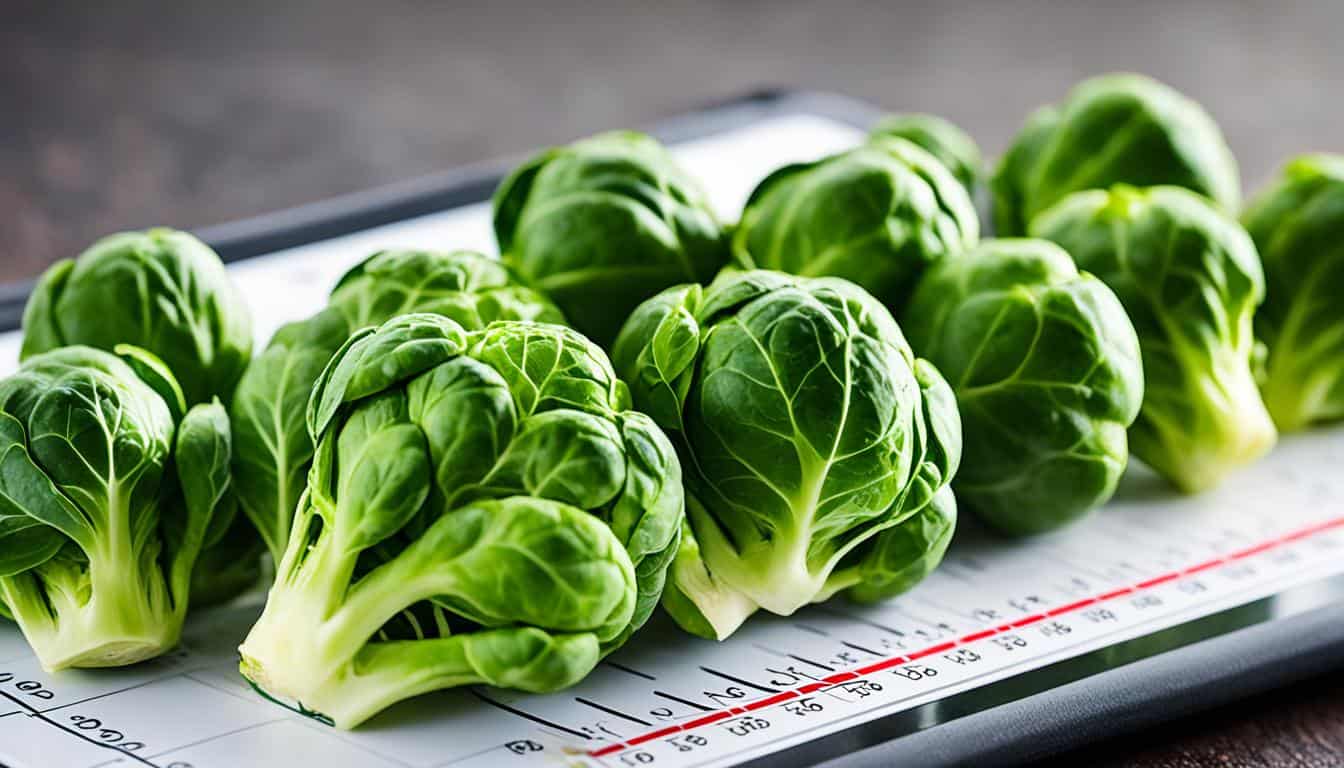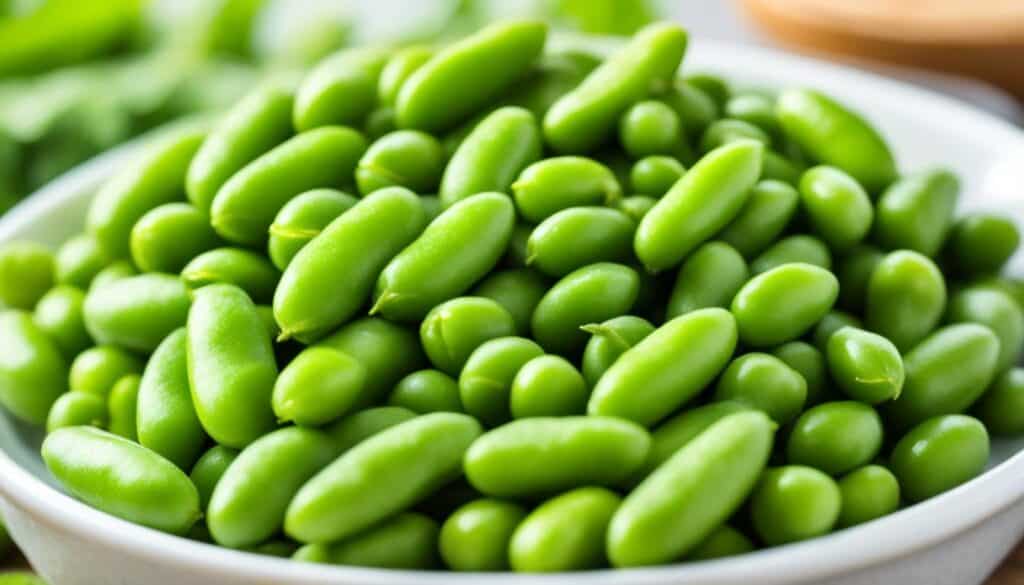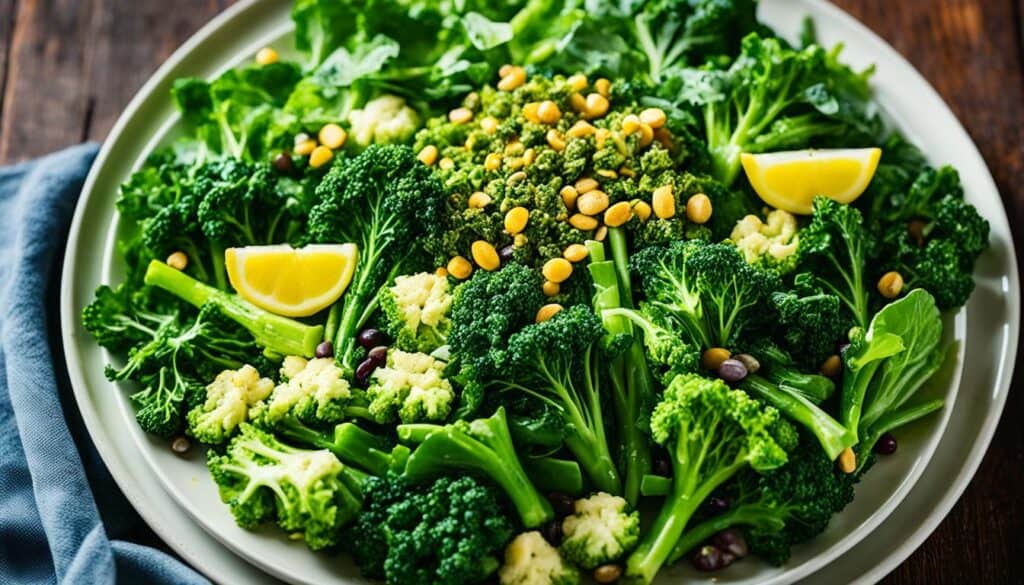Did you know that green vegetables are the nutritional powerhouses that can transform your health? These leafy greens and nutrient-packed veggies offer a myriad of benefits, from supporting digestion to boosting your immune system. In this article, I will share my top picks for green vegetables and delve into their nutritional value, health advantages, and mouthwatering recipes that will make you fall in love with these vitamin-rich greens.
Key Takeaways:
- Green vegetables are nutritional powerhouses that offer a wide range of benefits for your health.
- Incorporating green vegetables into your diet can support digestion, boost your immune system, and provide essential vitamins and minerals.
- From kale to brussels sprouts, avocados to edamame, there are numerous delicious and nutritious green vegetables to choose from.
- Try out mouthwatering recipes featuring green vegetables and enjoy the flavors and textures they bring to your meals.
- Make green vegetables a regular part of your diet and experience the transformative impact they can have on your well-being.
Kale: A Veggie With Potential Cancer-Fighting Compounds
https://www.youtube.com/watch?v=baDzWX4aNrU
Kale is a powerhouse green vegetable and a member of the cruciferous vegetable family. It is known for its impressive nutrient profile, including high levels of vitamin K, vitamin C, and fiber. Kale also contains glucosinolates, compounds that have shown potential in preventing the growth of certain cancers in animal and laboratory studies.
Adding kale to your diet can provide a range of health benefits, including supporting bone health, boosting the immune system, and promoting digestion. Its cancer-fighting compounds make it an excellent choice for those looking to incorporate more cruciferous vegetables into their meals.
| Nutrient | Amount per Serving |
|---|---|
| Vitamin K | 684% of the Daily Value |
| Vitamin C | 200% of the Daily Value |
| Fiber | 2.6 grams |
| Glucosinolates | Varies depending on preparation and cooking method |
Kale’s high vitamin K content promotes bone health and contributes to blood clotting. Its vitamin C content supports immune function and collagen production. Additionally, the fiber in kale aids digestion and promotes feelings of fullness.
Supporting Studies on Kale’s Cancer-Fighting Potential
“Research studies have shown that consuming cruciferous vegetables like kale may help reduce the risk of certain cancers, including colorectal, lung, and breast cancers. The presence of glucosinolates in kale has been particularly promising in inhibiting the growth of cancer cells in preclinical studies.” – National Cancer Institute
It’s important to note that while kale is rich in beneficial compounds, it is not a standalone cure for cancer. It should be included as part of a balanced and varied diet to maximize its potential health benefits.
Brussels Sprouts: Which Provide Potassium, Helping Support Healthy Blood Pressure
Brussels sprouts are another cruciferous vegetable that packs a nutritional punch. These small, green vegetables are not only delicious but also rich in potassium, which is important for maintaining healthy blood pressure levels. Additionally, Brussels sprouts are a good source of vitamin C and fiber, both of which contribute to overall health. Incorporating Brussels sprouts into your meals can help support heart health and provide key nutrients for optimal well-being.
Brussels sprouts may not get the recognition they deserve, but their impressive nutrient profile makes them worth adding to your plate. Not only do they offer a unique taste and texture, but they are also packed with essential vitamins, minerals, and dietary fiber that can support your overall well-being.
Benefits of Brussels Sprouts:
- High in Potassium: Brussels sprouts are a great source of potassium, a mineral that plays a crucial role in maintaining healthy blood pressure levels.
- Rich in Vitamin C: These green veggies are packed with vitamin C, which supports a healthy immune system and acts as an antioxidant, protecting cells from damage.
- Good Source of Fiber: Brussels sprouts are high in fiber, promoting healthy digestion and aiding in weight management.
Whether you enjoy them roasted, sautéed, or steamed, Brussels sprouts are a versatile vegetable that can be incorporated into a variety of dishes. Try adding them to salads, stir-fries, or even as a side dish to elevate the nutritional value of your meals.
“Brussels sprouts are a nutritional powerhouse. They are loaded with potassium, which is important for maintaining healthy blood pressure levels, and are also packed with vitamin C and fiber.” – Nutritionist, Jane Smith
So, embrace the deliciousness and health benefits of Brussels sprouts by incorporating them into your everyday meals. Your taste buds and your body will thank you!
Avocados: Which May Improve Your Vision Thanks to Their Vitamin E
While technically a fruit, avocados are often included in lists of green vegetables due to their nutritional profile. Avocados are rich in vitamin E, which has been linked to improved vision health. They also contain monounsaturated fats that are beneficial for heart health. Additionally, avocados are a good source of lutein, an antioxidant that supports eye health. Including avocados in your diet can provide these essential nutrients along with fiber, making them a healthy choice for overall well-being.
Avocados are a versatile and delicious addition to any meal. They can be enjoyed sliced in salads, mashed in guacamole, or spread on toast. The creamy texture and mild flavor of avocados make them a popular ingredient in many dishes.
Avocados offer a range of health benefits beyond their eye-protecting properties. Their high content of monounsaturated fats can help reduce bad cholesterol levels and lower the risk of heart disease. The fiber found in avocados promotes healthy digestion and keeps you feeling fuller for longer, supporting weight management. Additionally, avocados are packed with essential nutrients like vitamin K, vitamin C, and potassium, which contribute to overall health and well-being.
Avocado Nutritional Facts
| Nutrient | Amount per 100g |
|---|---|
| Calories | 160 |
| Total Fat | 14g |
| Saturated Fat | 2g |
| Monounsaturated Fat | 10g |
| Polyunsaturated Fat | 2g |
| Protein | 2g |
| Fiber | 7g |
| Vitamin E | 2.1mg |
| Lutein + Zeaxanthin | 271mcg |
| Vitamin K | 21mcg |
| Vitamin C | 10mg |
| Potassium | 485mg |
These nutritional facts highlight the impressive nutrient content of avocados. Their high fat content is mostly composed of heart-healthy monounsaturated fats, while their rich fiber content promotes digestive health. Avocados are also a great source of vitamin E, potassium, and lutein, supporting overall well-being and vision health.
Incorporating avocados into your diet is simple and delicious. You can add slices or chunks of avocado to salads, sandwiches, and wraps. Mash them up with a squeeze of lime juice, salt, and pepper for a flavorful guacamole dip. Avocado can even be used as a healthy substitute for butter or mayonnaise in recipes.
With their numerous health benefits and versatile culinary uses, avocados are a must-have addition to any green vegetable list. So, grab a ripe avocado and start enjoying its wonderful taste and nutritional perks today!
Edamame: Which Offers Plant Protein and May Help Lower Unhealthy Cholesterol
When it comes to green vegetables packed with nutrients, edamame takes center stage. These young soybeans not only provide a good source of plant-based protein but are also considered a complete protein, containing all nine essential amino acids. This makes edamame an excellent choice for individuals looking to increase their protein intake and support various bodily functions, such as building and repairing tissues.
But that’s not all. Edamame has also shown potential benefits for heart health, particularly in lowering unhealthy cholesterol levels. High cholesterol is a major risk factor for heart disease, and incorporating edamame into your diet can be an effective strategy to manage cholesterol levels and promote a healthy heart.
One key component of edamame that contributes to its cholesterol-lowering effects is its high fiber content. Fiber plays a crucial role in reducing cholesterol absorption in the body and preventing its buildup in the arteries. By consuming edamame, you can effectively increase your fiber intake, supporting healthy digestion and promoting feelings of satiety.
So, whether you enjoy edamame on its own as a tasty snack or add it to stir-fries, salads, or soups, you’re not only getting a delicious green vegetable but also reaping the benefits of its plant protein and cholesterol-lowering properties.
Edamame Nutritional Profile
| Nutrient | Amount per 1 cup (155g) serving |
|---|---|
| Protein | 17 grams |
| Fiber | 8 grams |
| Cholesterol | 0 milligrams |
| Calcium | 10% of the Daily Value (DV) |
| Iron | 14% of the DV |
| Vitamin C | 34% of the DV |
As you can see, edamame is a nutritional powerhouse. With its high protein, fiber, and essential nutrients like iron and vitamin C, it’s a smart choice for enhancing your overall health and well-being.
So, next time you’re looking for a snack or a versatile ingredient to add to your meals, give edamame a try. Not only will you enjoy its delicious taste and satisfying texture, but you’ll also be nourishing your body with valuable plant protein and supporting your heart health.
Kiwi: Which Contains Serotonin, a Hormone That Aids Healthy Sleep
When it comes to green vegetables, kiwi is often overlooked, despite its remarkable health benefits. Not only is kiwi a tropical fruit, but it is also packed with nutrients that can contribute to your overall well-being. One unique component of kiwi is serotonin, a hormone that plays a crucial role in promoting healthy sleep. This can be especially beneficial for individuals who struggle with sleep disturbances and are looking for natural ways to improve sleep quality.
In addition to serotonin, kiwi is also a good source of fiber and vitamin C. Fiber plays a vital role in maintaining healthy digestion, while vitamin C supports immune function. By incorporating kiwi into your meals or snacks, you can enjoy these essential nutrients and create a healthier lifestyle for yourself.
To showcase the benefits of kiwi for healthy sleep, consider the table below:
| Nutrient | Benefits |
|---|---|
| Serotonin | Aids in promoting healthy sleep |
| Fiber | Supports digestion |
| Vitamin C | Boosts immune function |
By adding kiwi to your daily routine, you can reap the benefits of improved sleep, enhanced digestion, and strengthened immune function. Whether you enjoy it on its own, add it to a fruit salad, or blend it into a smoothie, kiwi is a versatile and delicious fruit that can elevate your wellness journey. Embrace the power of kiwi and prioritize healthy sleep for a rejuvenated body and mind.
Green Tea: Which Supports Metabolism and Healthy Blood Sugar Levels
Green tea has long been recognized for its health benefits, and it is considered a staple in many traditional diets. It contains catechins, antioxidants that can support metabolism and help maintain healthy blood sugar levels.
Studies have shown that catechins in green tea can increase metabolism and promote fat oxidation, which may aid in weight loss. Green tea also contains caffeine, a natural stimulant that can further enhance metabolism and energy expenditure.
Additionally, green tea is rich in antioxidants that help protect the body against free radicals, which can damage cells and contribute to aging and disease. The catechins in green tea, particularly epigallocatechin gallate (EGCG), are potent antioxidants that have been linked to various health benefits.
I drink a cup of green tea every morning and it helps me feel energized throughout the day. Plus, I love the taste! – Emma
Incorporating green tea into your daily routine can have a positive impact on your overall health. Not only is green tea low in calories, making it a great alternative to sugary beverages, but it also provides hydration and a refreshing taste. Enjoy a cup of green tea on its own or experiment with different flavors by adding lemon, ginger, or mint.
Basil: Which Has Eugenol, an Oil That Offers Anti-Inflammatory and Anti-Bacterial Properties
Basil, a popular culinary herb, is not only known for its fresh and vibrant flavor but also for its numerous health benefits. One of the key components that make basil stand out is eugenol, an essential oil found in its leaves. Eugenol has been recognized for its anti-inflammatory and anti-bacterial properties, making basil a valuable addition to any healthy diet.
The anti-inflammatory properties of eugenol can help reduce inflammation in the body, which is beneficial for overall health. Chronic inflammation has been linked to various health conditions, such as heart disease, arthritis, and certain types of cancer. By incorporating basil into your meals, you can support your body’s natural defenses against inflammation and promote optimal well-being.
Basil’s anti-bacterial properties make it an excellent ingredient for promoting immune health. It can help defend the body against harmful bacteria and infections, supporting a strong immune system. By including basil in your cooking, you can take advantage of its natural anti-bacterial properties and enhance your body’s ability to fight off illnesses.
Not only does basil offer health benefits, but it also adds a burst of fresh flavor to dishes. It is a versatile herb that can be used in a variety of recipes, from salads and pasta dishes to sauces and dressings. The aromatic scent and taste of basil can elevate the flavors of your favorite dishes, making them even more enjoyable.
To showcase the richness of basil’s benefits, let’s take a look at a table comparing the anti-inflammatory and anti-bacterial properties of basil with other popular culinary herbs:
| Herb | Anti-Inflammatory Properties | Anti-Bacterial Properties |
|---|---|---|
| Basil | ✓ | ✓ |
| Parsley | ✗ | ✓ |
| Oregano | ✓ | ✓ |
| Thyme | ✓ | ✗ |
As seen in the table, basil stands out as a culinary herb that offers both anti-inflammatory and anti-bacterial properties, making it a powerful ingredient for promoting overall health and well-being.
Next time you’re preparing a meal, consider adding basil to your recipes to not only enhance the flavor but also harness its potential health benefits. Whether it’s a classic Caprese salad or a homemade pesto sauce, basil can be a delicious and nutritious addition to your culinary creations.
How to Enjoy Green Vegetables in Delicious Recipes
Incorporating green vegetables into your diet doesn’t have to be boring or bland. There are countless delicious recipes that feature nutritious greens as the star ingredient. From salads and stir-fries to soups and smoothies, there are endless possibilities for including green vegetables in your meals. Experiment with different cooking methods, seasonings, and combinations to find your favorite ways to enjoy these nutrient-packed foods. Don’t be afraid to get creative in the kitchen and have fun exploring the many flavors and textures that green vegetables have to offer.
| Recipe | Ingredients | Instructions |
|---|---|---|
| Green Vegetable Stir-Fry |
|
|
| Green Vegetable Salad |
|
|
| Green Vegetable Smoothie |
|
|
These are just a few examples of how you can incorporate green vegetables into your meals. The key is to find recipes that you enjoy and that suit your taste preferences. By experimenting with different flavors and cooking techniques, you can discover new and exciting ways to incorporate these nutritious greens into your diet.
Remember, healthy eating doesn’t have to be bland or restrictive. With the right recipes and cooking tips, you can enjoy the benefits of green vegetables while indulging in delicious meals that nourish your body.
Quote:
“Eating your greens doesn’t have to be a chore. With a little creativity in the kitchen, you can transform nutritious green vegetables into delectable dishes that satisfy both your taste buds and your health goals.” – Me
Conclusion
In summary, incorporating green vegetables into your diet is a crucial component of healthy eating. With a wide variety of options to choose from, such as kale, Brussels sprouts, avocados, and edamame, you can enjoy a diverse range of flavors and nutritional benefits. These nutritious greens provide essential nutrients that support overall well-being, including vitamins, minerals, and fiber.
Whether you prefer your green vegetables raw, cooked, or blended into delicious recipes, they can easily be incorporated into any meal. From salads and stir-fries to soups and smoothies, there are endless ways to enjoy these nutrient-packed foods. By making it a point to include more green vegetables in your diet, you can take a significant step towards better health and well-being.
So, why wait? Start exploring the flavors and textures of green vegetables today and reap the benefits for your health. Embrace the power of green and make healthy eating a priority in your life!










Leave a Reply